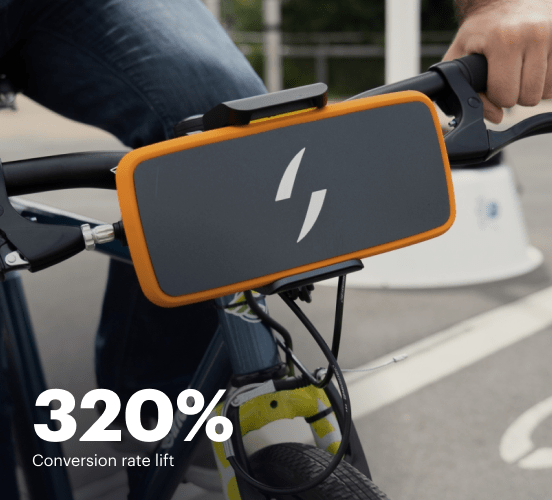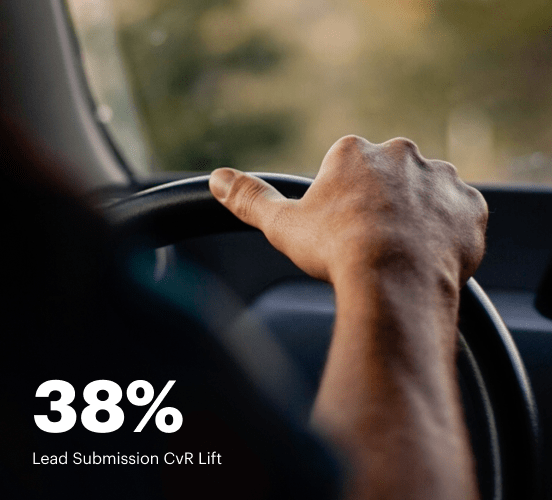How Form.io vs. Adobe Target vs. Instapage stack up against each other
Compare Instapage with Form.io and Adobe Target to create high-converting landing pages. With personalization, optimization, and collaboration tools, Instapage helps you deliver experiences that drive results.
Get startedSee how Instapage stacks up against the competition
| Feature | Instapage | Other builders |
| Drag-and-Drop Tools | ||
| Conversion-optimized templates | ||
| Manual and AI-powered A/B Tests | ||
| AI content suggestions | ||
| Popups and sticky bars | ||
| Canvas and grid blocks | ||
| Reusable and global elements | ||
| Form and popup builders | ||
| Built-in Heatmaps | ||
| Central analytics dashboard | ||
| Ad-to-page personalization and collections | ||
| Contacts, lists, and email | ||
| Dedicated, full-service CRO experts | ||
| Enterprise-ready platform |
Leading the way in building high-performing landing pages





Why Instapage is the smarter choice for your campaigns
Get everything you need to build, scale, and optimize high-converting landing pages—without coding.
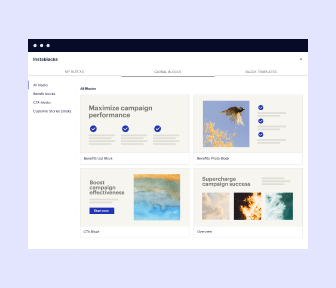
Easier page building without coding
Instapage offers a flexible and seamless page creation experience with a library of 500+ conversion-focused layouts, Instablocks®, a drag-and-drop builder, and AI content generation. With technologies like Thor Render Engine®, you can create on-brand, mobile-responsive landing pages that load quickly and start converting during initial visitor clicks.
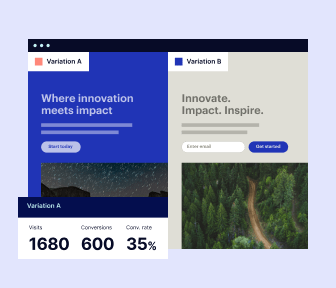
More insights — better results
Instapage lets you see in detail how each landing page experience and variation is performing so you can make targeted changes that boost page conversions. Use heatmaps for a better understanding of on-page activities, run A/B tests and AI-assisted experiments, and then track and evaluate results within robust analytics dashboards.
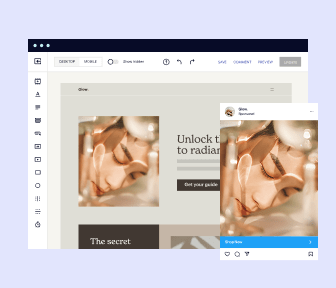
More personalized experiences
Instapage lets you quickly create high-performing landing pages tailored to each of your ad campaigns. Deliver personalized experiences for distinct audiences using dynamic text replacement. Effortlessly align specific advertisements to unique pages with AdMaps. Monitor audience-level metrics using our advanced data tools.
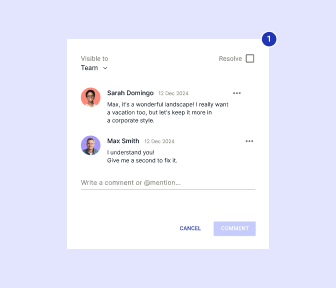
Built-in collaboration
Instapage collaboration capabilities bring your entire team together to speed up the process of landing page review, approval, and launch. No more frustrating and unnecessary revisions or edits scattered across emails. Provide instant feedback, conduct real-time page edits, and securely share your pages with outside stakeholders.
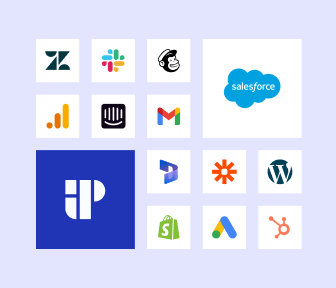
Free up time for your business
Invest time into business growth, not busy work. Launch landing pages faster with reusable forms and templates. Build once, reuse forever.
Explore all integrations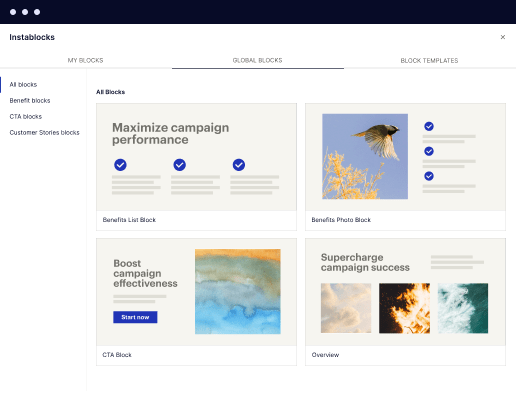
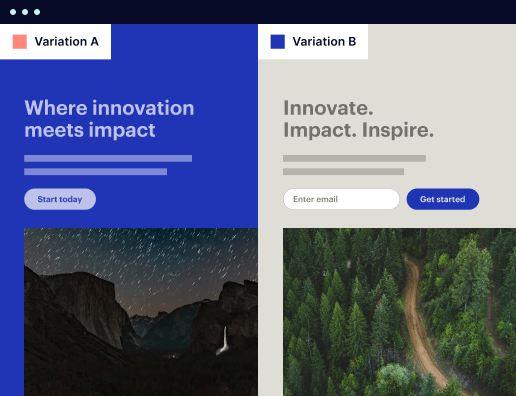
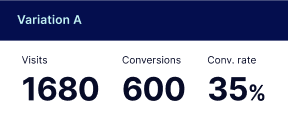
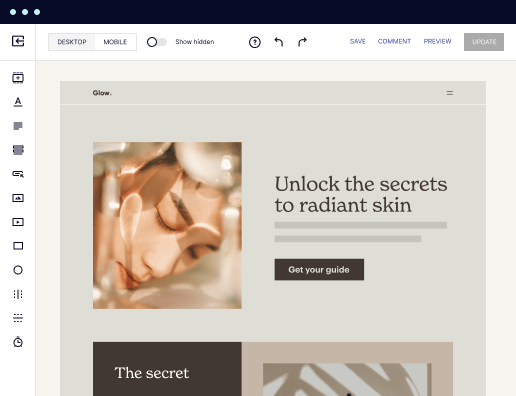

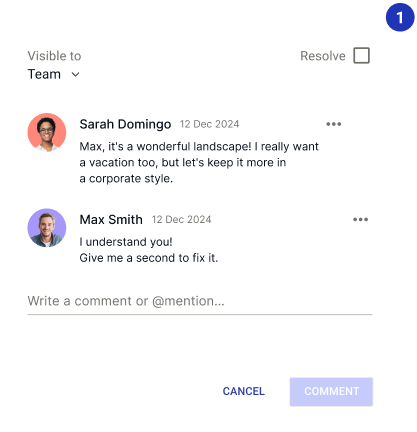
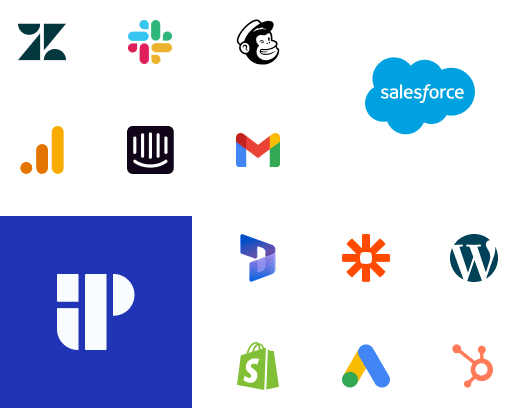
Easier page building without coding
Instapage offers a flexible and seamless page creation experience with a library of 500+ conversion-focused layouts, Instablocks®, a drag-and-drop builder, and AI content generation. With technologies like Thor Render Engine®, you can create on-brand, mobile-responsive landing pages that load quickly and start converting during initial visitor clicks.
More insights — better results
Instapage lets you see in detail how each landing page experience and variation is performing so you can make targeted changes that boost page conversions. Use heatmaps for a better understanding of on-page activities, run A/B tests and AI-assisted experiments, and then track and evaluate results within robust analytics dashboards.
More personalized experiences
Instapage lets you quickly create high-performing landing pages tailored to each of your ad campaigns. Deliver personalized experiences for distinct audiences using dynamic text replacement. Effortlessly align specific advertisements to unique pages with AdMaps. Monitor audience-level metrics using our advanced data tools.
Built-in collaboration
Instapage collaboration capabilities bring your entire team together to speed up the process of landing page review, approval, and launch. No more frustrating and unnecessary revisions or edits scattered across emails. Provide instant feedback, conduct real-time page edits, and securely share your pages with outside stakeholders.
Free up time for your business
Invest time into business growth, not busy work. Launch landing pages faster with reusable forms and templates. Build once, reuse forever.
Explore all integrationsGet started with Instapage in a few steps
-
Create your Instapage account
Start with Instapage by signing up via Google or your email. You'll get access to a free 14-day trial to discover Instapage capabilities. Feel free to cancel anytime during the 14-day trial if you decide that our product is not suitable for your business. -
Build and personalize your page
Create your first landing page from scratch or choose a template from 500+ customizable layouts. Use the drag-and-drop builder to add page elements, fonts, and backgrounds, refine content with AI, or add custom HTML, Javascript, and CSS. -
Review and make edits
Collaborate on page designs and streamline review processes. Invite your team members and stakeholders to review, edit, and provide feedback on your landing page. Collaborate knowing your page is confidential and only accessible to authorized users. -
Publish and track page performance
Publish your page to a domain or custom URL. Connect your pages to the ads you've created and track page performance within the analytics dashboard, run A/B tests and AI experiments, analyze results, and continuously optimize your landing page to maintain high conversions.
Instapage vs. Form.io vs. Adobe Target – The Ultimate Showdown
Choosing a landing page builder can be like selecting the perfect team for a big game—every player has their strengths and weaknesses, and the right combination can lead you to success. When we think about landing page builders, Instapage, Form.io, and Adobe Target are three contenders that bring unique skills to the arena. Each of these platforms showcases various features to help marketers create high-converting landing pages. In this comparison, we'll assess how these platforms stack up against one another, with a particular focus on how Instapage empowers marketers to thrive by reducing costs, growing conversions, and delivering relevant landing page experiences. So, let's dive in and see which hero helps you achieve marketing greatness! (This engaging overview sets an upbeat tone as we prepare to analyze each platform in detail, highlighting the importance of making an informed choice.)
Meet the Competitors: Key Players in the Landing Page Arena
First up in our comparison are the three distinct players in the digital landscape: Instapage, Form.io, and Adobe Target. Each contender has carved out a niche and boasts features designed to enhance users' experiences. Instapage shines as a specialist in producing stunning, high-converting landing pages with a robust suite of customization options. Form.io comes to the table with a strong API-driven approach that caters to developers looking for flexibility and extensive integration capabilities. Last but certainly not least is Adobe Target, a marketing tool that excels at personalizing user experiences—ideal for businesses that want to harness the power of data to drive user engagement. Together, these platforms comprise a competitive triptych that promises to elevate any marketing strategy. (This section highlights the individual strengths of each contender, setting a clear stage for a deeper exploration of their features and capabilities.)
Feature Face-off: Who Has the Best Tools?
Template Selection and Usability: A Quick Comparison
When it comes to feature sets, the variety of templates and overall user-friendliness can make or break a landing page tool. Instapage boasts a large library of professionally designed templates, which can be easily customized to fit any brand's style—an essential quality for marketers looking to maintain brand consistency. Form.io takes a different approach, offering templates geared towards developers who prefer employing custom coding, which can make the platform slightly complex for non-developers. Adobe Target, on the other hand, focuses on its testing and targeting functionalities. While its templates may not be as plentiful as Instapage, Adobe Target shines with its A/B testing capabilities, allowing marketers to fine-tune their landing pages based on real-time user data. This diversity in features highlights key preferences marketers should consider when selecting a platform. (This summary provides a direct comparison to help readers grasp the feature differences at a glance.)
Instapage: Your Go-To for Conversion Optimization and Customization
For those seeking an edge in conversion optimization, Instapage stands out with its numerous features designed specifically to maximize landing page performance. From advanced A/B testing options to dynamic text replacement, Instapage empowers marketers to tweak every element of their pages to resonate with specific audience segments. Additionally, its drag-and-drop builder makes creating high-quality pages intuitive, catering to users of varying technical backgrounds. Instapage also streamlines collaboration processes, allowing multiple team members to contribute, review, and approve designs seamlessly, empowering marketing teams to work more efficiently. More than just a landing page builder, Instapage positions itself as a valuable partner in marketers' quests for success, fostering brand trust and customer loyalty through highly relevant experience delivery. (This segment underscores Instapage's unique advantages and solidifies its place as a leader in the field.)
Speed and Performance: The Race to User Satisfaction
Let's face it—no one likes waiting. Think about it: standing in line at the coffee shop can ruin your morning if service is slow. Similarly, when it comes to landing pages, speed is pivotal. A delayed loading time can lead to users abandoning your site before they even see what you offer. Instapage emphasizes speed with its optimized page loading times, ensuring that visitors enjoy a seamless experience right from the start. Form.io's performance varies depending on the complexity of the custom templates; while customizable elements can slow down page loading, developers appreciate the flexibility they gain from its architecture. Adobe Target also performs well, particularly when integrated with the broader Adobe ecosystem, but its performance hinges on data-driven strategies—if implemented correctly, the results can be astonishing. As efficiency is an unwavering expectation in the digital world, evaluating the speed of each tool will reveal significant insights for decision-making. (This introduction prompts readers to think critically about the impact of speed on user experience and conversions.)
Instapage's Speed and Performance Benefits
- Lightning-fast load times for all landing pages and campaigns
- Optimized for both mobile and desktop viewing to enhance user experience
- Built-in speed optimization features that automatically enhance performance
- Compatibility with various ad platforms promotes efficient traffic generation
Speed Benefits of Form.io
- API-driven features that allow for efficient integration with various services
- Customizability can lead to performance dips if not managed correctly
- Suitable for tech-savvy users who can optimize their templates for speed
Adobe Target's Performance Attributes
- Strong A/B testing capabilities lead to optimal experience delivery
- Integrated within Adobe's suite enhances performance potential
- Data-driven optimizations can slow down if not properly configured
- Personalized content delivery may impact page load if not balanced
In conclusion, while all three platforms have their merits regarding speed and performance, Instapage clearly outshines the competition with its consistent focus on delivering snappy loading times and user satisfaction. This emphasis on speed is crucial, as marketers need every advantage possible to convert visitors into loyal customers. Ultimately, selecting the right tool means balancing speed against the needs specific to your marketing goals, but Instapage remains a strong front-runner in this category.
Navigating Usability: Which Platform is Easiest to Learn?
Usability is key for a platform's long-term success—regardless of a marketer's skill level, all users seek straightforward tools that don't require an engineering degree. Instapage impresses with its user-friendly interface designed with marketers in mind—offering comprehensive training resources and an intuitive drag-and-drop builder that requires minimal technological know-how. In contrast, Form.io, while powerful, presents a steep learning curve—a platform best suited for developers due to its complex custom features. Adobe Target finds itself somewhere in the middle, offering guided resources and tutorials to help marketers ease into the platform, but it may still feel daunting for newcomers. Each platform has distinct approaches to accessibility; however, Instapage excels above the rest. (This friendly chat not only explores usability but also reassures readers that proficiency can be achieved with any of these tools.)
Customer Support: Who's Ready to Assist?
Support can make a significant difference during a user's experience with any platform—think of it as the trusty sidekick who swoops in during times of need. Instapage boasts a solid customer support team offering multiple channels such as live chat, email, and detailed documentation to ensure users can find help whenever necessary. Form.io, while providing some support options, tends to focus on developer communities, which might leave less technical users feeling adrift. Adobe Target offers comprehensive support, but at times the information can be scattered, making it challenging for users to locate specific assistance. With customer care being so pivotal, it’s crucial to choose a platform backed by a team that empowers users effectively. (This section highlights the importance of robust support systems while painting an inviting picture for readers regarding support offerings.)
The Pricing Picture: Evaluating Value for Money
When considering a landing page platform, pricing always plays a critical role in the decision-making process, especially for businesses looking to maximize their budgets. Instapage employs a straightforward pricing model that reflects its extensive features and capabilities, appealing to those who prioritize return on investment from their marketing efforts. Form.io offers a more developer-centric approach, with pricing that varies based on customizations and integrations, catering primarily to tech-savvy users. In contrast, Adobe Target's pricing can be higher due to its robust data analytics and personalization capabilities but may be justified for businesses that require advanced features. Each platform presents a unique value proposition to its target audience, making it essential for businesses to evaluate which aligns best with their requirements and financial constraints. (Through this analysis, readers can appreciate the pricing structures and ultimately assess what resonates best with their marketing strategies.)
In wrapping up this comparison, it's clear that while all three platforms offer strong features, the ideal choice solely depends on individual business goals and preferences. Instapage clearly demonstrates its strengths with a focus on speed, usability, and customer support, solidifying its standing as the preferred landing page builder for marketers seeking to enhance conversions and elevate brand trust. In contrast, Form.io and Adobe Target each bring their unique insights, catering to diverse business needs. For those seeking an effective landing page solution, we encourage exploring Instapage through a free trial or demo to witness firsthand how it can transform your marketing efforts. (This conclusion encapsulates the discussion and encourages readers to take actionable steps forward with their landing page endeavors.)

